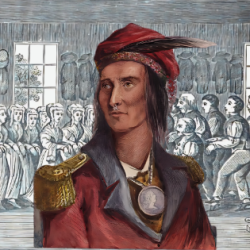Editors' Note: This article is part of the Public Square 2014 Summer Series: Conversations on Religious Trends. Read other perspectives from the Hindu community here.
Following the outcome of India's 2014 spring elections, many observers of Indian politics were struck , and perhaps taken aback, by the tremendous victory of Narendra Modi and the BJP, the party often associated with an aggressively pro-Hindu political agenda. The unqualified victory of the BJP issued in a decisive and unceremonious defeat of the Congress Party, long the standard bearer for liberal, secular politics in India, and historically associated with Gandhi, Nehru, and other leaders of the independence movement.
A chief concern for those uneasy with the BJP's victory is the potential for chauvinistic sectarianism, which violently pits religious groups against each other to protect interests, identities, and presumed values. Sectarianism in India has had a particularly charged history in the 20th and early 21st centuries, with perhaps the most vivid and tragic examples demonstrated by the Hindu-Muslim riots in the Indian state of Gujarat in 2002 and the destruction of the Babri Masjid (mosque) in the north Indian city of Ayodhya in 1992. The latter event, which resulted in two thousand deaths over several months and was led by the BJP, seemed to be an almost cynical use of religious rhetoric to maximize political power.
To begin, there is certainly nothing wrong with communities of shared values and interests organizing, socially and politically, to advance their causes and concerns. That's simply the nature of politics, and, in the United States, can be seen in any number of organizations to promote group interests and to support their preferred political candidate. Labor unions, teachers' federations, green parties, political action committees, and the AARP are only a few of many U.S. organizations mobilized to advance their interests and candidates in political America. But a serious problem emerges when healthy and appropriate social organization devolves into bald-faced tribalism, characterized by a hyper-investment in group identity and ideology.
Now, it appears that the world's religions seem to agree on what constitutes the most persistent and troubling human flaws: selfishness and self-centeredness. The problems issuing from individual egotism need no elaboration here. But tribalism, as with any ideology, unfortunately can become an extension of self 'writ large', and group self-centeredness has disastrous human consequences when its causes become absolutized and the enemy is objectified. The historical record in this case is horrific and haunting: Nazism, Stalinism, the Cambodia killing fields, and Hutus against Tutsis in Rwanda, among others. However, when tribalism's group egotism is minimized or moderated, it simply becomes part of the political fabric, advancing causes by conventional and healthy mechanisms of activism. Tribalism, however, often demonstrates a hyper-attachment to ideologies, with tribal members or leaders refusing to listen to reasonable—and perhaps qualitatively better—policy options. In the United States, the dogmatic, unrelenting, and uncompromising character of the Tea Party reveals such hyper attachment, joined with an unremitting effort to block any reasonable and constructive policy initiative from the White House.
But there are two things to note. Any unified political movement, whether Tea Party, Green Party, or BJP, is entitled, by its members' vision, conviction, and activism, to assume power. Such shows the strength of the democratic process. If others are concerned about what they perceive to be limitations in the vision or values of a particular political party, then it is incumbent upon them to do something about it, namely, argue, debate, organize, vote, and ultimately defeat the party in power. This is precisely what the BJP did in the spring elections, and it is ultimately a tribute to Indian democracy that it did. But here's where the rubber hits the road. The BJP, under Modi, now must lead wisely, and to do this in a multi-ethnic, multi-party system, there must be compromise. Absent that, he and his party will be summarily defeated in the next round of elections.
Even the most liberal democrats and conservative republicans in the United States presumably learn that successful politics must develop the art of pragmatic compromise. No doubt many Democrats in the U.S. were none too pleased with the election of Ronald Reagan in 1980, especially with his dubious "trickle down" economics, but Reagan, whose legacy is certainly complicated, nevertheless demonstrated an ability to compromise in his two terms and is remembered by many as a great American president. Still, his conservative politics, which economically benefitted some and harmed many others, eventually contributed to the election of Bill Clinton in 1992.




